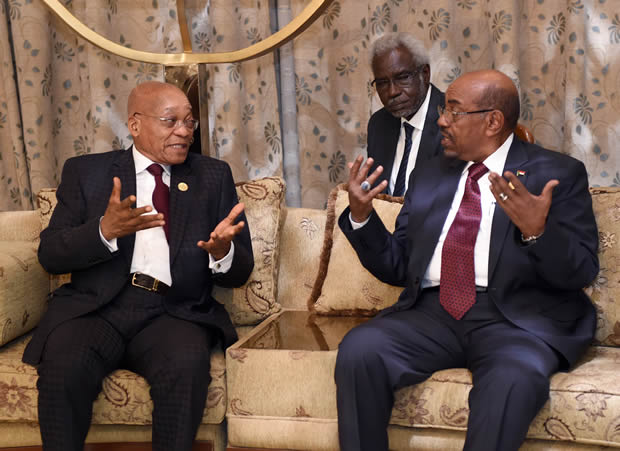
South Africa Withdrawing from International Criminal Court
South Africa is withdrawing from the International Criminal Court (ICC), it has been confirmed by the Minister of Justice and Correctional Services. SA’s foreign minister has submitted a signed ‘Instrument of Withdrawal’ document to the United Nations (UN), and the withdrawal will take effect one year after the UN Secretary-General has received the notification. South […]

South Africa is withdrawing from the International Criminal Court (ICC), it has been confirmed by the Minister of Justice and Correctional Services. SA’s foreign minister has submitted a signed ‘Instrument of Withdrawal’ document to the United Nations (UN), and the withdrawal will take effect one year after the UN Secretary-General has received the notification.

South Africa, along with other African nations like Kenya (which President Jacob Zuma visited last week), has claimed the ICC – which tries individuals for genocide, war crimes and crimes against humanity – is biased against countries on the continent.
The document allegedly says: “The Republic of South Africa has found that its obligations with respect to the peaceful resolution of conflicts at times are incompatible with the interpretation given by the International Criminal Court.”
Last year South Africa announced it wanted to leave the ICC after being criticised in June 2015 for refusing to honour the Rome Statue and arrest Sudan President Omar al-Bashir while he was in the country for the African Union. Bashir is wanted by the ICC for alleged genocide and war crimes, including the death of 300,000 people during the Darfur conflict. Bashir denies the allegations.
South Africa’s Supreme Court of Appeal (SCA) upheld a High Court ruling, earlier this year, that the SA government should have arrested Bashir.
Dewa Mavhinga from NGO Human Rights Watch criticised South Africa’s alleged withdrawal, saying it shows “startling disregard for justice from a country long seen as a global leader on accountability for victims of the gravest crimes.
“It’s important both for South Africa and the region that this runaway train be slowed down and South Africa’s hard-won legacy of standing with victims of mass atrocities be restored.”
Burundi became the first country, earlier this month, to announce its withdrawal from the 124-member ICC.
Reactions on Twitter have ranged from disappointment at the “lowering of the bar” to elation because the ICC is “grossly unfair” and dismissal – “Let’s be honest Mzansians, International Criminal Court is not relevant to SA,” said one. Some pointed out that the USA is not part of the ICC either, and one tweeted “jirre… can we at least just focus on one thing at a time?”
Many are however concerned, with tweets like: “SA’s withdrawal from the ICC really shows the kind of corrupt leadership we have in our country”, “Leaving the ICC is leaving people at the desperate mercy of corrupt and compromised national judiciaries” and “If you think SA is in a bad state now, leaving ICC will make it a free for all, anarchy riddled mess.”
UPDATE 10:51 SA Time, 21 October 2016:
Minister of Justice and Correctional Services, Adv Michael Masutha has briefed the media on the matter of the ICC and Sudanese President Omar Al Bashir.
Masutha pointed out that South Africa is a founder member of African Union and “plays an important role in resolving conflicts on the African Continent”.
He claimed the “implementation of Rome Statute of the #ICC Act, 2002, is in conflict with provisions of PIP Act of 2001” and confirmed that written notice to withdraw from the #ICC has been submitted to the SG of UN in accordance with Article 127(1) of the ICC.
Masutha said the withdrawal will take effect one year after the UN Secretary-General has received the notification and that South Africa will remain obligated under the Rome Statute for the duration of the 12 months’ notice period.
He said: “South Africa remains committed to the fight against impunity and to hold those who committed crimes against humanity accountable.
“South Africa will work closely with the African Union and other African countries to strengthen continental bodies.
“SA will continue to actively promote dialogue and the peaceful resolution of conflicts on the African continent and elsewhere.
“We have outlined that RSA is a participant in various human rights bodies such as African Court on Human and People’s Rights.”